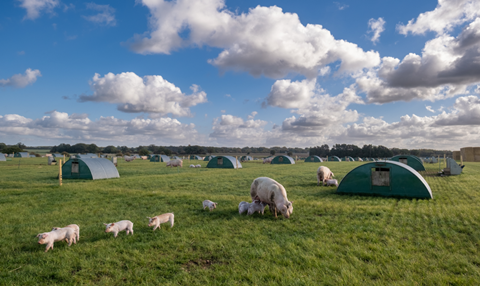Pilgrim’s UK, one of the UK’s largest food and farming businesses and higher welfare pork producer, has achieved a 62.5% reduction in its market-based scope one and two greenhouse gas (GHG) emissions (compared to a 2019 baseline), and a 11% reduction across scope one, two and three.

The announcement is included in the Pilgrim’s UK 2030: Sustainability Strategy Progress Report, which outlines the business’ progress against its sustainability roadmap and strategy.
The business works with more than 1,000 British pig farmers and 450 independent lamb producers, plus 2,500 Red Tractor Assured lamb producers.
Pilgrim's UK said that it is leading the way in its regenerative practices where it uses livestock to regenerate soil. This, coupled with its low GHG diet formulations means its pork farm footprint is 2.53 Kg CO2e/ Kg liveweight compared to the 4.68kg UK average.
The business has set a series of targets as part of its 2035 net zero target. Other notable pledges from the business include:
- Using 100% recyclable or reusable packaging by 2025
- Sourcing deforestation risk commodities from Verified Deforestation and Conversion free areas by 2025
- Achieving a 50% reduction in water intensity by 2030
- Targeting 5% soya inclusion in pig diets
The business already sources 100% renewable electricity, sources cardboard from sustainable sources and uses plastic made from at least 30% recycled plastic in its packaging.
An important part to play
Ivan Siqueira, president of Pilgrim’s UK, said: “As Britain’s number one higher welfare pork producer and a leading processor of pork and lamb products, as well as being part of the world’s largest food company, we have an important part to play in helping the UK’s transition to net zero.
“We’re laser-focused on delivering our Pilgrim’s UK 2030 sustainability strategy, which is underpinned by a robust investment and programme. While we’re proud of the progress we’ve made so far, we’ll never stop working to deliver our goal of being the most sustainable producer and supplier in the industry.”
Matt Dight, head of sustainability at Pilgrim’s UK, said: “Our Pilgrim’s UK 2030 strategy demonstrates our long-standing commitment to sustainability. That means going beyond basic industry standards while continuing to innovate to bring high quality, affordable food to supermarket shelves and food service outlets across the country. We’re determined to revolutionise the food supply chain, working with our retail and agriculture partners and industry stakeholders to reduce the impact of the food and farming sector. To do that, it’s important we hold ourselves to account, and while our 2022 sustainability report may be the first step in our reporting journey, we’re always looking to improve and go further.”
Over the past 12 months, the business’ activity has been underpinned by a commitment to spending £10 million of its capital expenditure to implement a series of process innovations and operational improvements at its manufacturing and processing sites. Pilgrim's UK said that it sites are centres of operational excellence and deploy techniques to uphold this status, which has helped to reduce its overall GHG emissions to date thanks to lean manufacturing processes.
This story was originally published on a previous version of the Meat Management website and so there may be some missing images and formatting issues.












